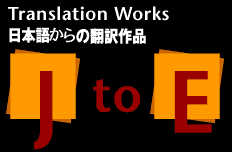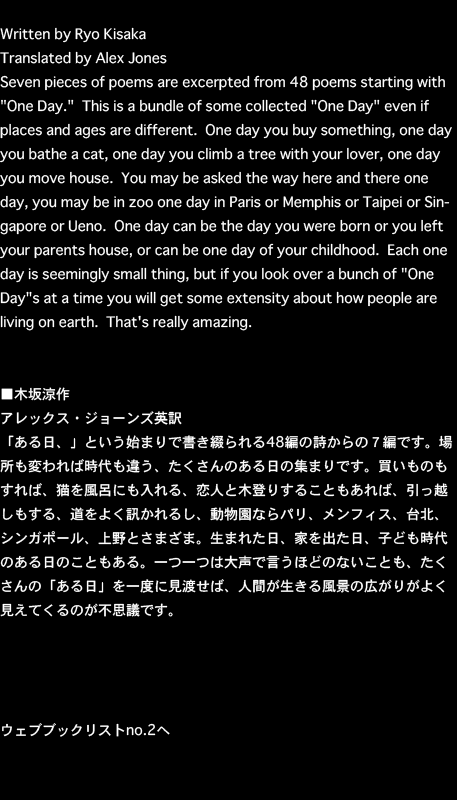





■ポール・デイヴィッド・メナ著 だいこくかずえ日本語訳
テナメント(借家のアパート)の向こうにみえる、ニューヨークの風景や日常を、軽やかに、ときにシニカルに切りとって描写したポールの初めての作品集。
Written by Paul David Mena Translated by Kazue Daikoku
This is Paul's first book in which he cut out and described the landscapes of New York and people's daily life seen through tenement houses, lightly and sometimes cynically.


■アレクセイ・V・アンドレイエフ著・英訳 だいこくかずえ日本語訳
ロシアからアメリカに留学して1年、テレビのコマーシャルやソープオペラでマスターした英語で、アレクセイ君は詩を書いてみる決心をしたのです。
Written by Alexey V. Andreyev Translated by Kazue Daikoku
Alexey was a Russian student studying abroad in the USA. Once there, he discovered that poetry can be written in English as well, and after a year of studiously watching commercials and soap operas he resolved that his English was up to the task. This is his first serious attempt.


■ジョン・サンドバック著 だいこくかずえ日本語訳
アメリカ中部、ミズーリ州に住む詩人が、森や、雲や、川や、カラスや、月や、雨や、水晶をうたって、不思議なあじわいのハイク集をつくりました。
Written by John Sandbach Translated by Kazue Daikoku
In this book the author has written haiku about woods, clouds, rivers, crows, the moon, rain, and crystals in Missouri where he lives. His poems bring a new and unique feeling to the haiku form.


■メアリー・オースティン著 だいこくかずえ+ジェフ ブラワー日本語訳
開拓時代のカリフォルニアの自然界の物語を、インディアンのマハラ(女)のストーリーテリングでつづる、大人にも子どもにも楽しい、心洗われる14の物語。


■ポール・ブルック著 だいこくかずえ日本語訳
結びこぶ、ビーズ、より糸といったコ・イス(素材)を使って紡がれた紐(ひも)の日記帳。ひとつひとつのコ・イスはその年のある一日の出来事や思い出を記します。1600個の玉飾り、10メートルをこえる糸ごよみの物語。


■メアリー・オースティン英語訳 だいこくかずえ +ジェフ・ブラワー日本語訳
ミヤギユカリ挿画
シカ星、それは夏の夜明け、東の空低いところにあらわれる明るい星の名前。シカ星に導かれるようにして、この詩集は生まれました。ドローイングとともに楽しむ、詩画集のようなアンソロジーです。
Re-expressed in English by Mary Austin, Translated into Japanese by Kazue Daikoku and Jeff Brower
Artwork by Yukari Miyagi
The Deer-Star is the name of the bright star that may be seen low down in the eastern sky at sunrise on summer mornings. We feel we were led to publish this anthology by the Deer-Star. We invite you to enjoy these beautiful poems and drawings.
=upward=


■ミロク・リー 著 だいこくかずえ 日本語訳
浅倉恵美子 アートワーク制作
5歳のミロクとスアムは従兄弟どうし、いっしょに遊び、いっしょにごはんを食べ、どこへでもいっしょにでかけて行く仲間だった。朝鮮半島出身のドイツ語作家ミロク・リ−によるこの作品は、ミロクが抗日運動の果てに、1920年、ヤールー川を渡ってヨーロッパに亡命するまでのことを綴った自伝的小説です。





Written by Yoko Tawada (Japanese original text)
Translated by Alison Watts
Because the author, Yoko Tawada didn't use her mother tongue, Japanese, during her life in Germany, she lost her Japanese once which she had been using in Japan. As a result, she acquired new Japanese in her brain and her body, and began to speak it freshly and write her works in Japanese. This is the story about her strange experiences.
■1999年 青土社刊 多和田葉子著「カタコトのうわごと」より
多和田葉子・文 アリスン・ワッツ英訳
ドイツで日本語のない生活をする中で、昔つかっていた日本語を一度失い、新たなからだで日本語を話し、作品を書くようになった多和田葉子さんの不思議な体験。
=upward=


An extract from the preface of a book by Peter Barakan, written in Japanese, published under the title "Boku ga aisuru rock meiban 240,"
Written and translated by Peter Barakan
'Ro-bu-tsun' rather than 'Ro-baa-to-son'(Robertson), 'a-kuu-su-tikku,' not 'a-ko-o-su-tikku,'(acoustic). If we try to pronouce them thoroughly, Japanese katakana will be showed like these. It is very difficult for Japanese to change something which was once accepted in our society, even if it is absolutely incorrect. This is not a problem just with katakana....
■1998年 講談社α文庫刊
ピーター・バラカン著「ぼくが愛するロック名盤240」まえがきより
ピーター・バラカン・文
「ロブツン」「アクースティック」、徹底的にやれば、カタカナはこうなる。日本では間違っていても、世の中で通っているものは、変えるのがむずかしい。これは、カタカナだけのことではないかもしれないけれど。
=upward=



Written by Sansei Yamao
Translated by Marek Lugowski and Kazue Daikoku
Web design and art work by Yoshimi
Sansei is a poet who lives on beautifully green Yaku Island, which is located in the south of Japan. We translated his poem "Make the fire" from the book "Birouba bousi no shitade"(published in Yasosha) into English. "Make the fire" is a poem in which the poet would like to convey the fire of a primitive heart to his children.
■山尾三省作
マレク・ルーゴウスキー+だいこくかずえ英訳
アートワーク、ウェブデザイン:Yoshimi
屋久島の詩人、山尾三省の『びろう葉帽子の下で』(野草社)から、原始の人間のこころを子どもたちに伝える「火を焚きなさい」を英訳して紹介します。


Written by Sansei Yamao
Translated by Marek Lugowski and Kazue Daikoku
Illustration by Randy Grace
Web design by Yoshimi
Mitto-kun is the youngest, sixth, son of Sansei Yamao, 3 or 4 years old at the time in which this poem is set. Sansei Yamao wrote poems about this little son, and these works come across both deeply true and marking the deep love of a father for his son. These two qualities strike a fine balance in these poems.The world of this poem, although particular to a place and time, is not merely fixed in the intimate space of a father and son sharing a moment. In doing so, this world opens up widely on something truly universal.
■山尾三省作
マレク・ルーゴウスキー+だいこくかずえ英訳
イラストレーション:ランディ・グレース
ウェブデザイン:Yoshimi
ミットクンというのは三省さんの末っ子(6番目)の道人くんのことです。三省さんは小さなミットクンについていくつかの詩を書いていますが、どれも詩人であることの厳しさと、一人の子の父であることの優しさ、その二つのバランスの上にみごとに結晶しているところが素晴らしいです。


Written by Sansei Yamao
Translated by Marek Lugowski, Ruth Foley, Kazue D.
Web design and art work by Yoshimi
Sansei Yamao passed away on 28 August 2001 in his favorite haunts, on the Yakushima Island. The translation team of Happa-no-Kofu started translating this poem into English in the end of August(2002), thinking about him. We think "A Moonlit Night"(Tsukiyo) has expressed Sansei's lifelong wish emotionally.
■山尾三省作
マレク・ルーゴウスキー+ ルース・フォーリー+ だいこくかずえ英訳
アートワーク、ウェブデザイン:Yoshimi
2001年8月28日、山尾三省は自身の「原郷」と呼んでいた屋久島で亡くなりました。一年後の8月末、葉っぱの坑夫の翻訳チームは、「月夜」の翻訳にとりかかりました。「月夜」という詩には、山尾三省の終生の願いが、美しい月夜の晩を背景に、静かに、感情深く、あらわされています。
[4] 夜明けのカフェ・オーレ / Dawn Cafe Au Leit
[5] 山で / At the Mountain
=upward=



Written by Ryo Kisaka
Translated by Ruth E. Foley and Kazue Daikoku
Photograph by Seidoh SUJAKU
This poem was written about the time when the author studied abroad, in the United States. After English class she(the author) talked with her classmate, Doumbia under the tree. Each one speaks of her hometown. The original text of this poem is written in Japanese, but actually these two women had to speak in English, which is not their mother tongue. So the translation into English brings back their original conversation. And one more interesting thing is that the translator, Ruth Foley, actually teaches English to Speakers of Other Languages (ESOL) for a nonprofit organization in Massachusetts.
■木坂涼作
ルース E・フォーリー+だいこくかずえ英訳
写真:朱雀正道
木坂さんの詩にはアメリカ留学時代のことをつづったものがいくつかあります。「1:00 PM」もその中のひとつ。ニューヨーク市立図書館の木陰で、英語のレッスンのあと、まだ知り合って間もないと思われるクラスメート二人が話をしています。多分ポツリポツリとかわされたであろう英語での会話。それぞれの故郷のこと、家族のこと。そのときその場にはどんな風が吹いていたのでしょうか。この詩は日本語で書かれたものですが、考えてみれば、オリジナル(実際の)の会話は英語でなされていたはず。英語への翻訳は、どんな会話がそこで行き交ったのだろうかと想像して復元する作業のようでもありました。


Written by Ryo Kisaka
Translated by Ruth E. Foley and Kazue Daikoku
Photograph by Yoshimi Sugioka
Like '1:00 P.M.' this poem is written about the time when the author lived in New York City. It is also about her grandmother in Japan. Two places intersect, connected by aged women both in NYC and Japan, with desolation and pain in the author's mind. The translators, Ruth and Kazue, talked much about aged people in their own country when they were translating this poem. They felt many cultural differences between Japan and the USA on this subject.
■木坂涼作
ルース E・フォーリー+だいこくかずえ英訳
写真:杉岡至美
この詩も著者がニューヨークに住んでいたとき出会ったことを題材にしています。そして日本に住むお祖母さんのことを思って書いた詩でもあります。二つの場所は、それぞれに住む年老いた女たちをつうじて交差します。著書の心の中で、ある痛みの感情をともなって。訳者二人はこの詩の翻訳中に、それぞれの国における老人たちの暮らしぶりや家族関係について、いろいろ話をしました。アメリカと日本。違いと共通点。気づいたのは、老人の問題は突きつめていくと過去の家族制度にまで行きつくということでした。


